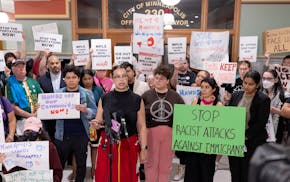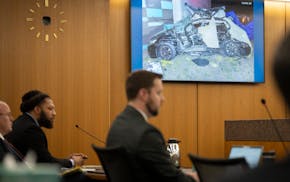Steve Shand worried as he waited for the first group of smuggled Indian migrants to cross the border from Canada into Minnesota one frigid winter night.
"It's 16 degrees cold as hell," Shand texted an alleged smuggler from his van in December 2021. "They going to be alive when they get here?"
The migrants arrived safely, and Shand drove them to Chicago without trouble.
But the next month, a family of four migrants — including two children — froze to death on the border after failing to reach Shand's van amid a subzero blizzard. Authorities say that Shand and the man he was texting, Harshkumar Patel, frequently spoke of the risk of smuggling Indian nationals through the deep cold of the northern border but persisted anyway. They allegedly coordinated four more illegal border crossings before the deaths on January 19, 2022, led to criminal investigations stretching all the way to India.
In Fergus Falls, Minn., federal prosecutors plan to argue at a trial scheduled Monday that Shand and Patel participated in a "large, systemic human smuggling operation" that brought Indian nationals to Canada on student visas, then smuggled them into the U.S.
The court proceedings are expected to offer a rare inside look into the workings of migrant smuggling on the northern border, where international media coverage of the deaths of Jagdish Patel, 39, his wife, Vaishaliben, 37, their daughter, Vihangi, 11, and son, Dharmik, 3, have failed to slow illegal crossings.
The U.S. Border Patrol reported a record 198,929 encounters with migrants across the Canadian border in the 2024 fiscal year — an 81% increase since the year the Patel family died. Most encounters happen in the sector covering New York, Vermont and New Hampshire, but some law enforcement officials from border communities in the Grand Forks sector that includes Minnesota also describe a crisis.
In congressional testimony this May, Sheriff Roger Hutchinson of Renville County, N.D., lamented a lack of border agents to adequately patrol the Grand Forks Sector, with some temporarily deployed to the southern border. He said that law enforcement along the northern border has dealt with dead bodies, high speed pursuits, fence-cutting, damaged crops, humanitarian rescues in extreme conditions, illegal substances, counterfeit goods and subjects with warrants.
Although most migrants they encounter are Nigerians, Romanians and Indians, "our biggest concern is who we did not catch," Hutchinson said. "We have a wide-open, vast border, with no natural physical barriers and very few man-made ones."
Last year, Border Patrol agents from the Pembina, N.D., and Warroad, Minn., stations apprehended 20 Mexican nationals who crossed the border without papers. This July, agents there stopped 16 people making three illegal entries, including nationals of not just Mexico but Poland, too.
'We not losing any money'
Harshkumar Patel and the deceased Patel family all hail from the west Indian state of Gujarat, where a steady influx of immigrants has legally immigrated to the U.S. since the 1960s and 70s and found success as business owners and professionals. (Patel is a common surname in that region and the defendant and victims are not related.)
The Indian press, however, has reported in recent years about operations in Gujarat and several other states that arrange the illegal passage of people to the U.S. for hefty fees. Record surges of Indian nationals have been unlawfully crossing both of America's borders. Jagdish Patel's family hailed from the middle-class village of Dingucha, but the father of two struggled to earn enough money as a factory worker and teacher and wanted to move to the U.S. for more opportunity.
Meanwhile, authorities said Harshkumar Patel was denied a visa to come to the U.S. five times and ultimately appeared to have arrived illegally through Canada.
Patel came to America to escape poverty and stagnation in India and to try to make a better life for himself and his family, according to a statement by his attorney, Thomas Leinenweber. Patel "now stands unjustly accused of participating in this horrible crime," Leinenweber said. "He has faith in the justice system ... and believes that the truth will come out at the trial."
Patel was managing a strip mall casino in Orange City, Fla., when he met Shand, a cab driver who was picking up and dropping off gamblers at the establishment. Shand told authorities Patel recruited him to participate in a scheme of picking up migrants at the Minnesota border and driving them to Chicago for payment. (Gujarati police told U.S. authorities they suspected that an Indian restaurant chain owner in Chicago facilitated the smuggling of the migrants so they could work for substandard wages to pay off debts.)
Shand began flying from Orlando to Minneapolis and renting cars to travel to the border. He constantly texted Patel — saved in one of his phones as "Dirty Harry" — updates on his locations and put the migrants on speaker phone with Patel so they could communicate in their native tongue of Gujarati. The migrants didn't speak English, and Shand didn't know their language.
For his role, Shand received about $25,000 from Patel.
In December 2021, Border Patrol agents noticed a pattern of illegal crossings just east of Pembina, N.D., in Minnesota after finding fresh boot prints in the snow at the remote intersection of 180th Street and 410th Avenue N. — and even a backpack with a price tag in Indian rupees.
On Jan. 17, 2022, Shand rented a Chevrolet 15-passenger van in Minneapolis. He drove north and met with a friend who told him, "Be careful tonight. It is not nice out there." She sent him a screenshot of a blizzard warning showing that winds would gust as high as 50 mph and the weather with wind chills would drop as low as 45 degrees below zero.
Shand forwarded the warning to Patel at 1 a.m. on January 19 and texted him, "Make sure everyone is dressed for the blizzard conditions please."
"Done," Patel responded.
"We not losing any money," Shand said.
He sent Patel videos of the blizzard.
Migrants in the snow
Around 3 a.m., Shand's van got stuck in the snow as he approached the same remote intersection. He and Patel traded calls and Patel texted him to flash his lights so the migrants could find him.
But just two migrants located Shand.
A technician on his way to work at the pump station saw Shand with the two migrants in the van, got a tractor and pulled him from a ditch. A Border Patrol agent pulled over Shand; when asked if there were others still out walking, Shand said no. Yet authorities found five migrants emerging from the fields, one so hypothermic she was airlifted to Regions Hospital in St. Paul with frostbite.
One migrant identified as V.D. was carrying a backpack with photos of toys, diapers, children's clothes and photos of the Patel family, who had become separated from the group. V.D. told investigators he had paid $87,000 to smugglers in India who helped secure him a fraudulent student visa.
Canadian Mounted Royal Police discovered the bodies of the Patel family frozen 13 yards from the U.S border, the father still holding his youngest child wrapped in a blanket.
A jury indicted Shand and Patel on charges of conspiring to bring unauthorized immigrants to the U.S. and transport them, causing serious bodily injury and placing lives in jeopardy. The indictment said the men attempted transportation of aliens in the U.S. for purpose of commercial advantage or private financial gain, and that they also aided and abetted that crime.
Among the witnesses expected to testify: a bevy of law enforcement officers, those who provided medical treatment to some surviving migrants and the Canadian forensic pathologists who conducted autopsies of the dead migrants. The government may call one or more of the Indians who made it across the border on Jan. 19, 2022, the prosecution said in its trial brief.
Prosecutors also could call a cooperating witness who was part of the alleged human smuggling conspiracy and sent many of the migrants to Winnipeg to cross into Minnesota after he was unable to move them from British Columbia into Washington state.
Though the brief did not name the witness, it appears to refer to the case of Rajinder Pal Singh, who pleaded guilty last year in federal court in Seattle to conspiracy to transport and harbor certain aliens for profit and conspiracy to commit money laundering. He admitted that he received $500,000 as a key member of a smuggling ring that brought hundreds of Indian nationals from Canada into Washington and then to locations in the Midwest and beyond between 2018 and 2022.

How the federal raid unified the fractious Minneapolis City Council against Trump, sort of
Trump travel ban 'cruel,' Minnesota advocacy group says

Minneapolis City Council lowers street food cart license fee, hoping fruit sellers will hawk legally

No verdict after first day of jury deliberation in Derrick Thompson murder trial for crash that killed 5

